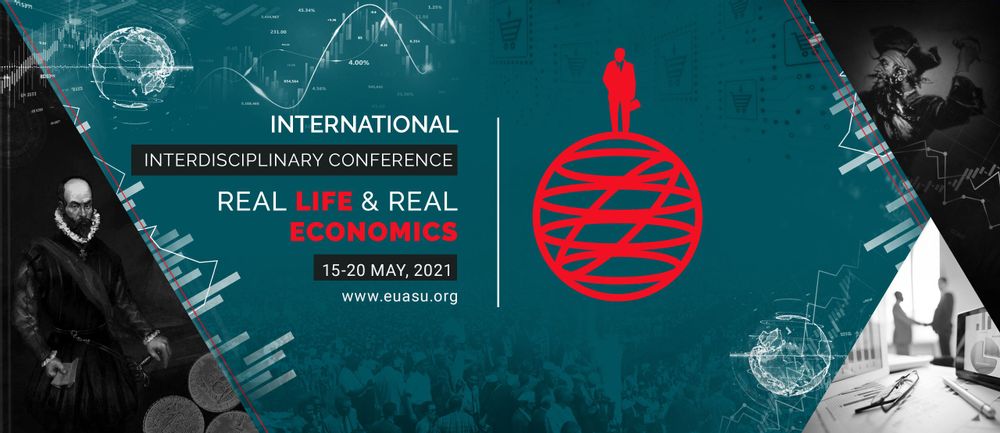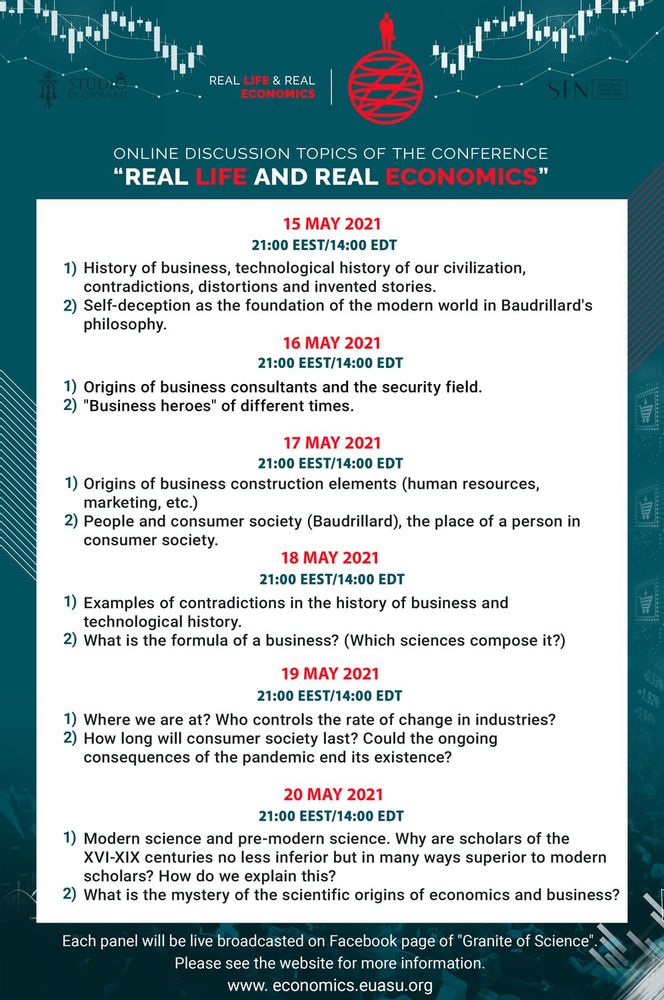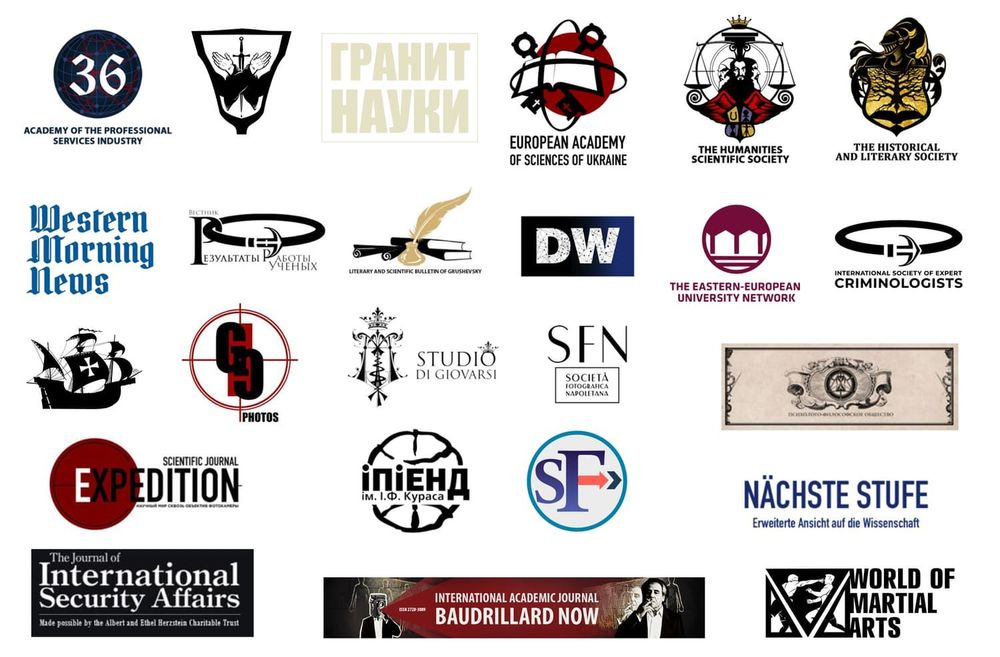
International Interdisciplinary Conference "Real Life and Real Economics"
May 15, 2021
"Self-deception is the foundation of this world—a circle with no way out. The axis of self-deception is defined by three factors: global misinformation, into which each newborn is immersed just like into a lava; the media, and the most important factor—time. Time that erases data, memory, understanding."
When: 15-20th May, 2021
Register: https://economics.euasu.org/
There are many insoluble paradoxes in the advanced and technologically driven 21st century. One of these cornerstone mysteries is the factual history of business, economics, and even day-to-day technologies. If it is considered that "money rules the world," then why, is it the case, there is no single reasonable idea, how and where money came from? What was the progression of metamorphosis and transformations that allowed impersonal pieces of paper and electronic signals to become today the central exchange equivalent?
Some 250-300 years of the ruling class, elite, and aristocracy with a birthright to bear arms did not occupy themselves with questions about "money." What happened? What prompted or forced heavily armed warriors to "voluntarily" obey the call "Down with arms!" and give up the power of the swords and spears in favor of the nominal power of money, non-existent in nature?
Another ambiguous mystery: since business is a crucial element of the evolution of human activity, why is there no single discipline of ‘business history’ (except for a few common speculative concepts)? Consequently, if the ‘economy’ is an integral part of public and social relations, then why does every country have several divergent historical vectors? How many ‘economic and business histories’ are written and rewritten? Undoubtedly, the expression "history is written by the victors" is not a new paradigm. However, the following paradox is a red line in the background of the previous questions: how is it possible to engage in professional activities and conduct business in the conditions of the total absence of an accurate picture of the origins of the business, history, and developmental course of development? Provided that people cannot distinguish truth from lies, facts from fiction, reliable from unreliable?
There is no history of business, history of economy or history of human civilization. These categories simply do not exist as a reflection of scientifically established knowledge of laws. Many researchers, treading the pathway of obstacles derived from false data, simply give up in hopelessness. "Business is business!" is the verdict—a multifaceted conclusion and restless justification of why some suffer severe punishment for things that are authorized to others.
These phenomena, these elements of our lives, did not arise "on their own." Everything has its history, its consistent tendency and its course of evolution. Business and its configuration were developed, designed, and commissioned by some on a global level. Who, in this case, is more competent to answer recurring questions about the true essence of business and economy? Certainly, immediate "architects" or creators. Unfortunately, the beginning and escalation of business took place several centuries ago, and it is not possible to find an architect and address to him any articulate questions.
Nevertheless, we can bring together leading scholars, experts and practitioners from different fields of science and other spheres who have dedicated their professional activities to solving concrete business problems and untangling the oxymorons prevalent in the field. By combining research efforts, the world's leading scholars, experts, practitioners and financial journalists will attempt to reconstruct history and answer all the "X" questions through constructive dialogue and discussion. This direct attempt can lead to meaningful and effective conclusions applicable in daily life activities.
To this end, the international interdisciplinary conference "Real Life and Real Economics", where this "business paradox" will be considered on the academic level for the first time, will take place on May 15-20, 2021. In the context of online discussions, aspects of economics, management, business, consulting, security and science indispensable for the success of separate individuals, business people and CEOs of companies will be looked into. On the agenda are topics and intricacies that are not looked into deeply enough in higher education institutions with MBA programs.
The question ‘why do some businesses function for centuries, and others disintegrate before they even have time to form?’ has been around for a while. In today's world of frantic speeds, rapidly changing markets, financial crises, inflation, emergencies and economic crimes, we have witnessed that few can cope with the consequences of these characteristics. The 2020 pandemic has demonstrated how vulnerable businesses, manufacturing, individuals and the whole systems are. The fact is that most people (if not all) try to do business or strategic consulting without knowing the origins of management, business, technology and the economy as a whole.
Every individual is responsible for his own life, and if someone prefers to live by his/her illusions, it is their right. Being ignorant is not illegal but it is not necessary. However, it is worth asking oneself, what is the cost/value of the information you ‘googled’ today?
Zero cents. However, competent advice/expert consultations from a person who is responsible for the advice he gives costs a lot. Interestingly, why?
Different categories of people have different degrees of misinformation in modern societies, which creates a difference of statuses. While some businesses are currently closed during this crisis, others are thriving and reaching a new level of success. The last year has vividly demonstrated this. It is a personal choice. One can be an exemplary representative of the ‘consumer society’, read and adopt a philosophy of mainstream sources about history/economy/business/technology, and continue to raven on misinformation... because when a person is surrounded only by misinformation, he starts believing it. And only failures and losses make one question the reliability of the data he leans on. However, it is not the only option. An interdisciplinary approach based on practical and valid data permits the development of an objective view.
This conference, "Real Life and Real Economics", brings together scientists and researchers from more than seven disciplines, practicing businessmen, economists, journalists, as well as specialized experts from different fields. Every topic of online discussion panels is considered exclusively at the intersection of several disciplines. We hope that the conference is helpful for those who care about their own lives, businesses and professional activities. Understanding the fundamentals of the economy can provide answers about the knowledge and skills necessary not only for surviving in the market in unpredictable conditions but for achieving the wellbeing of many, a process which is not spontaneous but mastered.
The conference "Real Life and Real Economics" will be held on 15-20 May, live broadcasted on our media partner "Granite of Science" (https://www.facebook.com/granit.nayki) publication’s Facebook page at 21:00 EEST/14:00 EDT. For more information: http://economics.euasu.org/

PANEL QUESTIONS:
15 May 2021
1) History of business, technological history of our civilization, contradictions, distortions and invented stories.
2) Self-deception as the foundation of the modern world in Baudrillard's philosophy.
16 May 2021
1) Origins of business consultants and the security field.
2) "Business heroes" of different times.
17 May 2021
1) Origins of business construction elements (human resources, marketing, etc.)
2) People and consumer society (Baudrillard), the place of a person in consumer society.
18 May 2021
1) Examples of contradictions in the history of business and technological history.
2) What is the formula of a business? (Which sciences compose it?)
19 May 2021
1) Where we are at? Who controls the rate of change in industries?
2) How long will consumer society last? Could the ongoing consequences of the pandemic end its existence?
20 May 2021
1) Modern science and pre-modern science. Why are scholars of the XVI-XIX centuries no less inferior but in many ways superior to modern scholars? How do we explain this?
2) What is the mystery of the scientific origins of economics and business?


